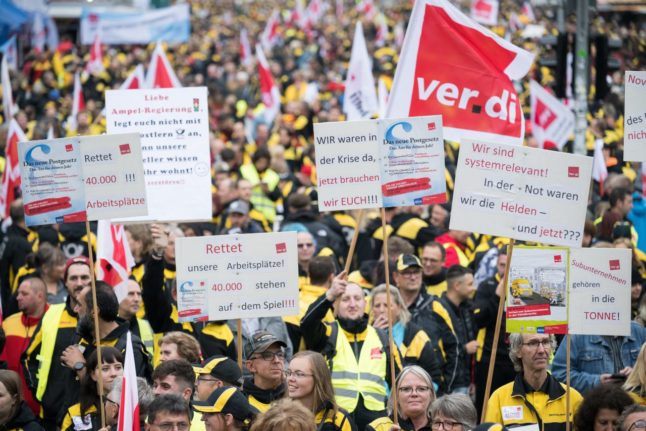While Germany may be lagging behind with its digitalisation plans, there's one area where the march of technology is having an impact: the postal service.
The number of letters sent via post has slipped dramatically in recent years. Back in 2017, more than 18.5 million letters were sent within Germany. By 2022, this had fallen to just 14.1 million.
As part of its plans to reform the postal system, Deutsche Post has been clamouring for a two-tier postal delivery system. This would mean that, instead of being delivered within a day or two, the majority of letters would take up to three days to arrive at their destination as standard.
Anyone requiring quicker delivery would have to opt for 'Prio' or priority post, the company said, adding that this service would cost extra. However, as Deutsche Post representative Nikola Hagleiter told Welt am Sonntag, “we aren’t talking about doubling the price”.
Currently, Deutsche Post is Germany's only universal postal operator, meaning it delivers mail in all regions of the country. As such, it is legally obliged to deliver 80 percent of its letters within a single day.
The company has argued that the changes are needed to battle higher costs and slipping margins. However, critics of the plans point to the fact that the transition from letters to emails has been more than made up for by a boom in online shopping.
In 2022, for example, Deutsche Post netted record profits of €5.1 billion - representing a 69.6 percent uptick since 2020.
More postal stations, fewer post offices
Another key part of Deutsche Post's proposals is to amend the law to permit automated parcel stations to take the place of staffed post offices or parcel drop-off centres in local communities.
The law currently requires the universal operator to provide at least one service centre in every district with at least 2,000 residents. In areas with more than 4,000 inhabitants, there should be access to at least one post office within a 2km radius.
According to Deutsche Post, this has created significant issues in smaller towns where local shops and other businesses are closing their doors. In one district near Stuttgart, for example, the company has been unable to find locations for sending and receiving parcels and has to set up its own sales point there.

"There you have three hairdressers, a car repair shop and an undertaker - these are all not such ideal partners for us," CEO Tobias Mayer told Association of Business Publicists.
Instead, Deutsche Post wants to expand its automated 'postal stations', where people can purchase stamps, drop off and pick up parcels and get video advice. There are currently 300 of these in Germany, with the company hoping to roll out more in the coming years.
The comprehensive postal stations are an extension of its DHL Packstationen, or parcel stations, which allow people to drop off and pick up parcels. There are 12,500 of these in Germany and more are in the pipeline. They have the benefit of offering round-the-clock service, Meyer said, in contrast to post offices with restricted opening hours.
READ ALSO: What you need to know about sending post between Germany and the UK after Brexit
Thousands protest in Berlin
On October 9th, which was also World Post Day, around 30,000 Deutsche Post and DHL workers gathered at Berlin's Brandenburg Gate to protest the proposed amendments to Germany's postal laws.
According to the union Verdi, which represents postal workers, the plans for Prio post could result in tens of thousands of job losses and a further decline in working conditions in the sector.

"In this labour-intensive sector, parcel and letter delivery, a new downward spiral in working conditions must not be set in motion by intensifying competition," the union said.
This would intensify a trend that has been going on for years, it added.
READ ALSO: Postal workers across Germany go on strike
Draft law expected soon
The German government is currently grabbling with the question of how to stimulate competition in the small parcels and letter delivery segments, where new providers struggle to compete with Deutsche Post.
Back in January, the Ministry of Economics stressed the need for "regulatory incentives" to offer new players a fighting chance in the post delivery market.
According to the Federal Network Agency, Deutsche Post - the former national postal service that was privatised in 1999 - currently corners 85 percent of the market in letters.
The ministry is expected to present a concrete draft bill soon.

Comments